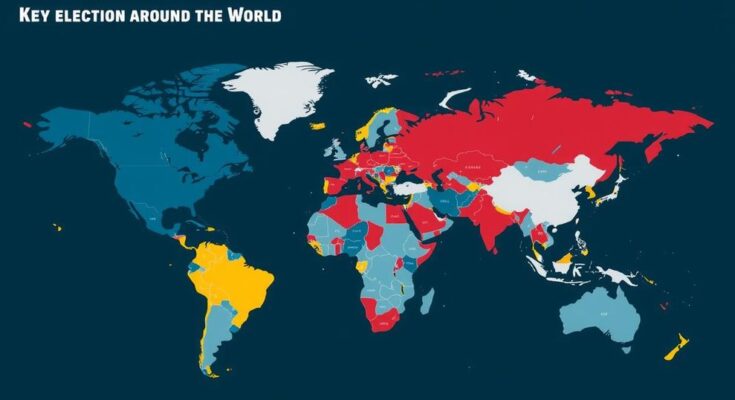In 2024, major elections worldwide shaped the political climate, with Donald Trump’s return in the U.S. signaling a shift in global politics. India’s Modi faced a weakening position, while Mexico elected its first female president. South Africa’s ANC lost its majority, marking a historical change. Japan’s ruling party suffered setbacks, Pakistan experienced turmoil over Imran Khan, and electoral dynamics in the UK and France shifted unpredictably. In Senegal, a decolonial mandate emerged, reflecting broader trends across Africa.
As the year 2024 concludes, we reflect on a series of pivotal elections that shaped the global political landscape, with over one billion individuals casting their votes. In the United States, Donald Trump’s return to office has marked a significant shift in both domestic and international politics, leading to increased tensions across various institutions. Meanwhile, India’s historic elections have shown a decline in support for Prime Minister Narendra Modi amidst a growing opposition. Mexico witnessed a breakthrough with the election of its first female president, Claudia Sheinbaum, illustrating a rare success for the ruling party. South Africa’s elections resulted in the ANC losing its majority, prompting a newly formed coalition government. Japan’s Liberal Democratic Party experienced a historic setback, yet maintains its political influence. In Pakistan, the political turmoil reflects the ongoing saga of former Prime Minister Imran Khan, still imprisoned but a symbol of significant public support. In the UK, Labour’s impressive win has begun to falter, while France’s unexpected snap election has complicated its governance. Lastly, Senegal’s election underlines the rise of decolonial sentiments throughout Africa, reflecting broader global political trends.
The year 2024 has been marked by a series of significant elections around the world, reflecting a diverse array of political sentiments and outcomes. In places such as the United States, India, and South Africa, incumbents faced unprecedented challenges, leading to substantial shifts in power dynamics. Concurrently, nations like Mexico and Senegal have seen the emergence of new leadership that reflects ongoing social and political movements. This collection of electoral shifts highlights the ever-evolving landscape of global politics.
The elections of 2024 have underscored a critical turning point in numerous countries, revealing a pattern of incumbents confronting substantial opposition. The outcomes in the United States, India, and Mexico demonstrate varying degrees of political mobilization, while upheavals in South Africa and Japan indicate a shift in governance models. The continuing strife in Pakistan and changing political sentiments in the UK and France further illustrate the volatile state of democratic engagement worldwide. Collectively, these elections will influence both national policies and international relations for years to come.
Original Source: www.semafor.com




